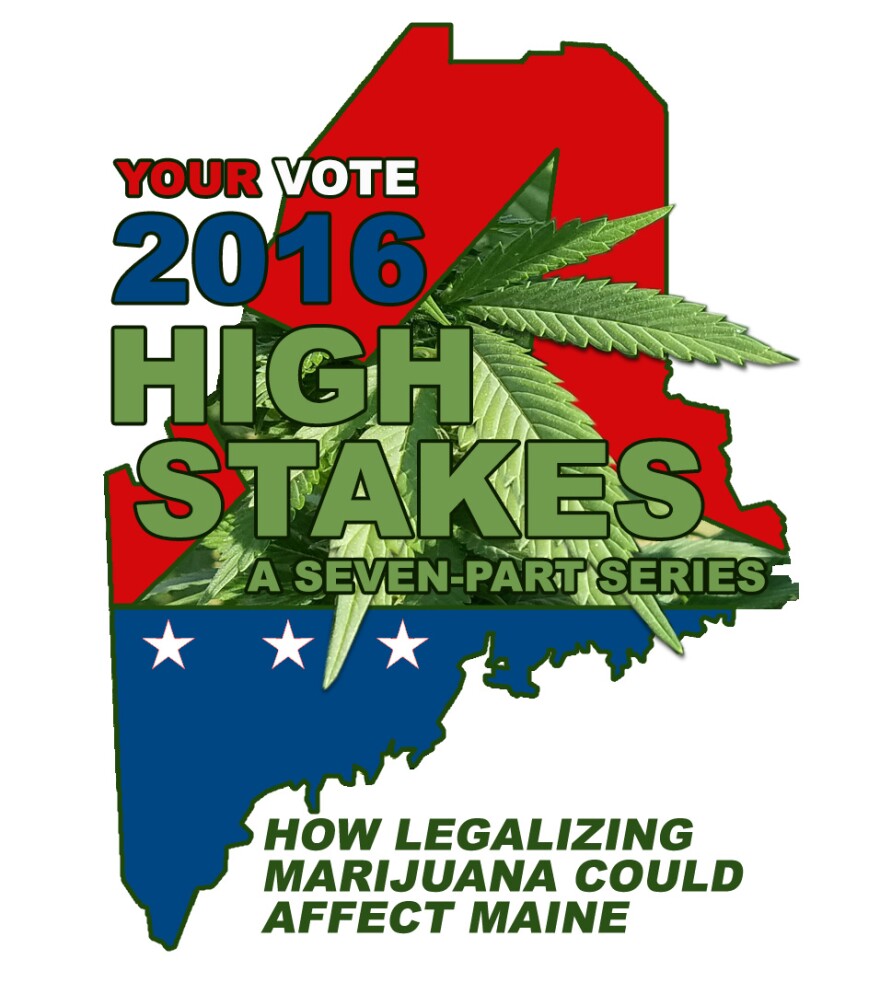When it comes to marijuana, Maine historically has been on the permissive side. It was one of the first states to decriminalize penalties for possession back in the ’70s and was one of the first to authorize the use of marijuana for medicinal purposes.
Three years ago, Portland became the first city on the East Coast to legalize recreational use for adults.
This fall, voters statewide are being asked to follow Portland’s lead. Passage of Question 1 on the ballot would establish a framework to distribute, tax and regulate the sale of marijuana and marijuana products.
All this week we’re taking a closer look at the issue with a series of reports called “High Stakes: How Legalizing Pot Could Affect Maine.” Today, in part one, Steve Mistler looks at how Maine might look to Colorado’s experience for guidance.

Legalizing marijuana is flashpoint issue all across the country. Polls show more than half of all Americans think it should be legal, nearly half have tried it and most think alcohol is more dangerous, yet it’s still outlawed at the federal level. So advocates legal pot are focusing their efforts in the states, taking their case directly to the people.
This year the battleground includes California, as well Maine and Massachusetts on the East Coast. As voters here consider whether to join the legalization movement, people are looking to other states for guidance.
Colorado residents and tourists first went shopping for legal pot two years ago on New Year’s Day. They flooded shops like Northern Lights Cannabis Co., one of five retail stores in Edgewater, a small city just west of Denver.
Kaboom is a featured strain at Northern Lights, described as “fast-paced,” perfect to “get things done.” At first glance, Kaboom seems like the perfect metaphor for the Colorado cannabis industry: Marijuana sales exploded to nearly $1 billion last year, an increase of more than 40 percent from two years ago.
The state collected $135 million in taxes and fees, much of it earmarked for school projects. And the combined local tax revenue from pot businesses such as Northern Lights have the small city of Edgewater speeding up the timetable for infrastructure projects, including a $7 million civic center.
“Revenue has exceeded expectations in Colorado, right? So, there’s millions and millions of dollars that Maine is flushing down the drain. It’s here. It’s just not going to the state. It’s not going to the legitimate businesses,” says David Boyer, campaign manager for the Maine legalization campaign.
On the wall of the campaign’s headquarters is a replica of “Reefer Madness,” the 1936 movie famous for its over-the-top depiction of marijuana. The clock is purposely stuck at 4:20 — weed smoker code marking the time to light up.
Some polling data suggest Mainers are ready to push the clock forward and legalize pot. But are they prepared? The Colorado experience shows just because voters are willing doesn’t necessarily mean the public or the government knows the best way to do it.
“This is not like a light switch. You just don’t decide to turn on a system of this magnitude without a lot of really critical thought of how you’re going to do it,” says Andrew Freedman, who has an official government title but mostly goes by “pot czar.”
Freedman, 33, was picked by Colorado Gov. John Hickenlooper to help agencies coordinate the state’s implementation of the legalization law. He says he neither expected, nor sought, this job.

But that, from Hickenlooper’s perspective, made Freedman the right choice. Colorado needed a fresh face to bring together the warring factions to help construct a $30 million regulatory apparatus that affects marijuana users, sellers and the public.
“There’s a whole bunch people who have wanted this for a long time and have really gone to war with the other side and don’t trust them still,” Freedman says.
It was a massive effort, one Freedman compared to building an airplane — while it’s still flying. There has been turbulence.
Three months after retail sales began in Colorado, the Denver Post reported some retailers’ edible marijuana products did not contain the amount of THC advertised on the package. Some people got sick, others got ripped off, but there were few consequences. That’s because adequate product testing and penalties against manufacturers hadn’t been fully implemented.
“We truly had no guidelines to do this, no roadmap to go from. It was, I think, the rarest thing to happen in state government, to be creating something from scratch,” Freedman says.
The state’s Legislature scrambled to keep up. It has passed dozens of bills to fill the gaps or fix problems not considered by the citizen-initiated law.

Maine will need to create a similar regulatory system — also from scratch. That job will fall to the Department of Agriculture, Conservation and Forestry, an agency that was once three different departments, but got consolidated a few years back. Exactly how the department would take on these new duties remains unclear.
A spokesman for the agency declined to comment on how, or even whether, it’s preparing.
“Anytime you’re creating an entirely new industry and regulatory structure there are going to be some challenges to overcome,” says Alysia Melnick, the political director for the legalization campaign.
Melnick says the state can learn from Colorado. It will cost money, but she says taxing marijuana sales should be more than pay for the new regulatory system.
But about that tax revenue — Freedman cautions against making big promises.
“I think anybody doing it for the tax implications are doing it for the wrong reasons,” he says.
Take Colorado: The state collected over $135 million in taxes and fees last year — money it didn’t collect before two years ago, but according to state tax records, less than 1 percent of the state’s $14 billion in tax collections in fiscal year 2015.
The state has a $27 billion budget, and it costs about $30 million to regulate the pot industry itself.
Beyond the revenue stream, Freedman says there may be other reasons to legalize, such as diverting cops to problems more pressing than busting people for possessing or smoking weed. Melnick says this is a critical issue for the legalization campaign.
“It’s about reserving our criminal laws for the type of acts that actually threatened our communities,” she says.
The arrests for marijuana-related offenses has plummeted by nearly 50 percent since Colorado legalized pot. Possession charges dropped by nearly 90 percent.
But unlike Maine, Colorado had never decriminalized possession charges in the first place. And Freedman says other problems have surfaced, including the emergence of a shadow market, where people are legally growing but illegally selling the product out of state.
It’s a lucrative business and Freedman worries it will undercut the regulated industry.
“This home grow situation really has started to get out of control and we are seeing kind of the criminal element come into Colorado and grow at home,” he says.
“The only effective way to stop the black market is to have a legal market,” says Oregon Congressman Earl Blumenauer.
Blumenauer thinks the black market will disappear as more states legalize. And he and other legalization advocates argue that the revenue and taxes in Colorado is money that otherwise would have flowed through illicit trade.
Still, public safety concerns have led to a backlash of sorts in Colorado. Seventy percent of the state’s cities and towns have banned commercial operations by ordinance. The Maine legislation has a similar opt-out provision.
Melnick says it’s clear Colorado does not have buyer’s remorse. Instead, she says people are looking West to see the future of pot.
Blumenauer, whose home state voted to legalize two years ago, agrees. He says Mainers could be on the leading edge of a movement that could one day topple the federal prohibition of pot.
“This is the year that the movement is cresting,” he says.
Mainers will decide whether they want to ride the wave when they go to the polls Nov. 8.
To read the rest of the series "High Stakes: How Legalizing Pot Could Affect Maine," click here.




